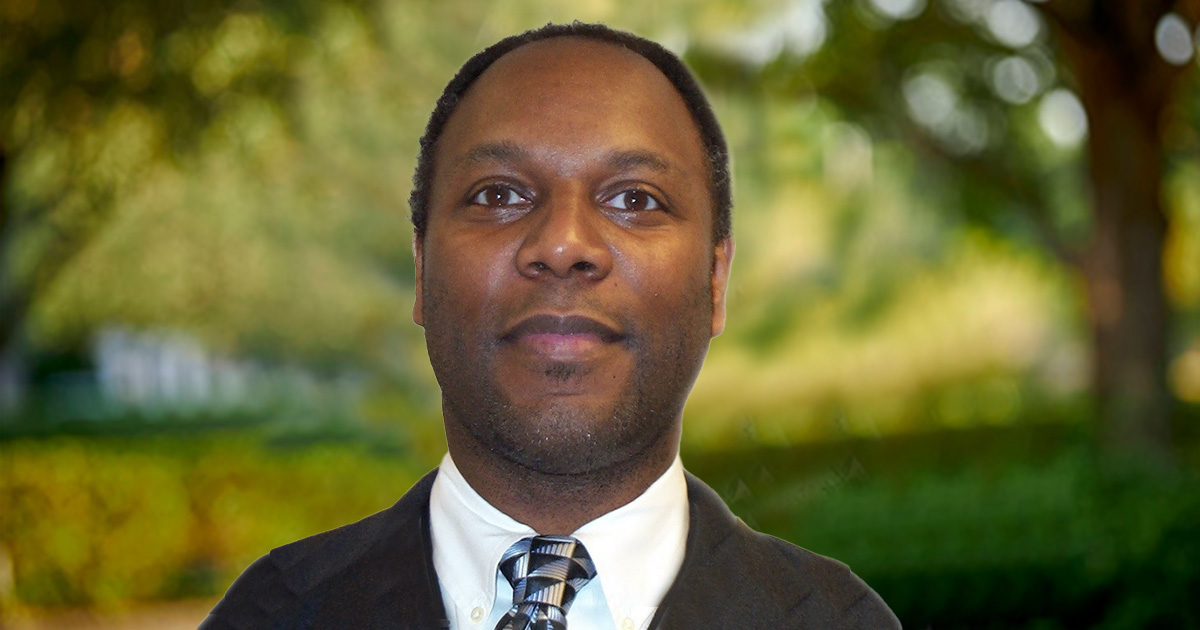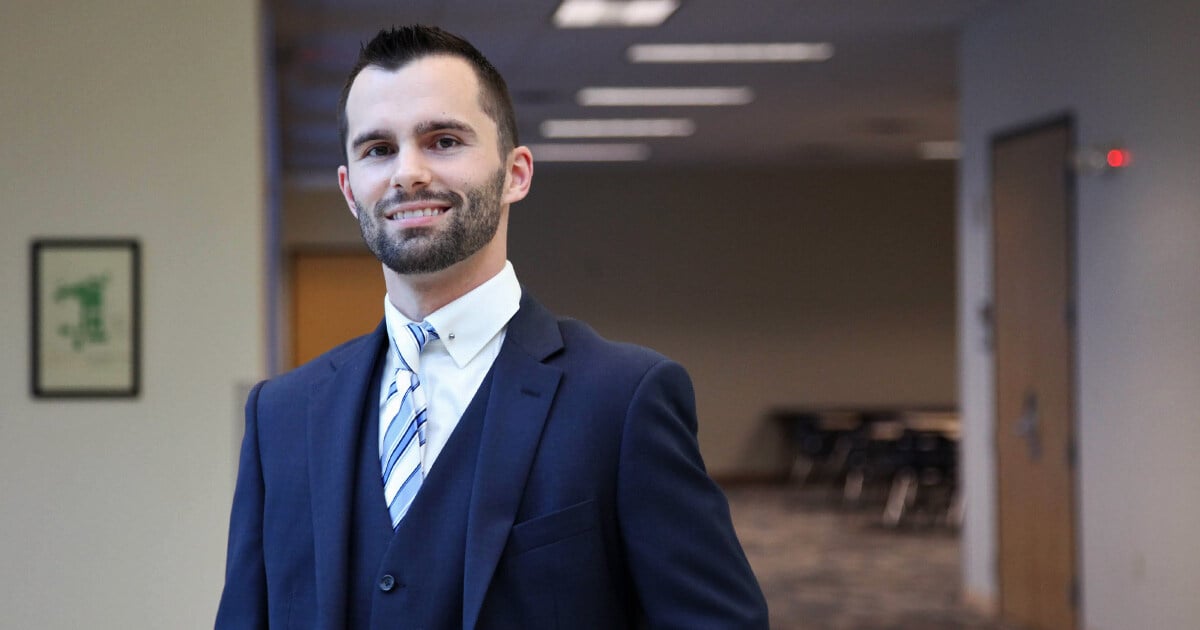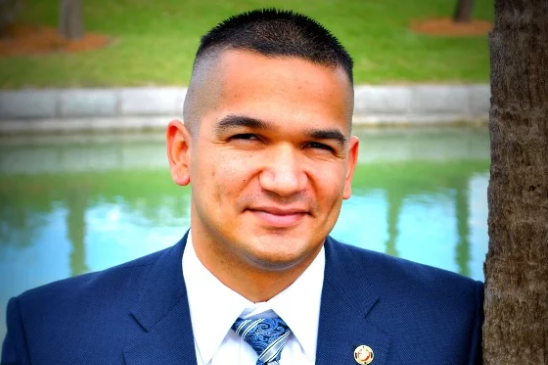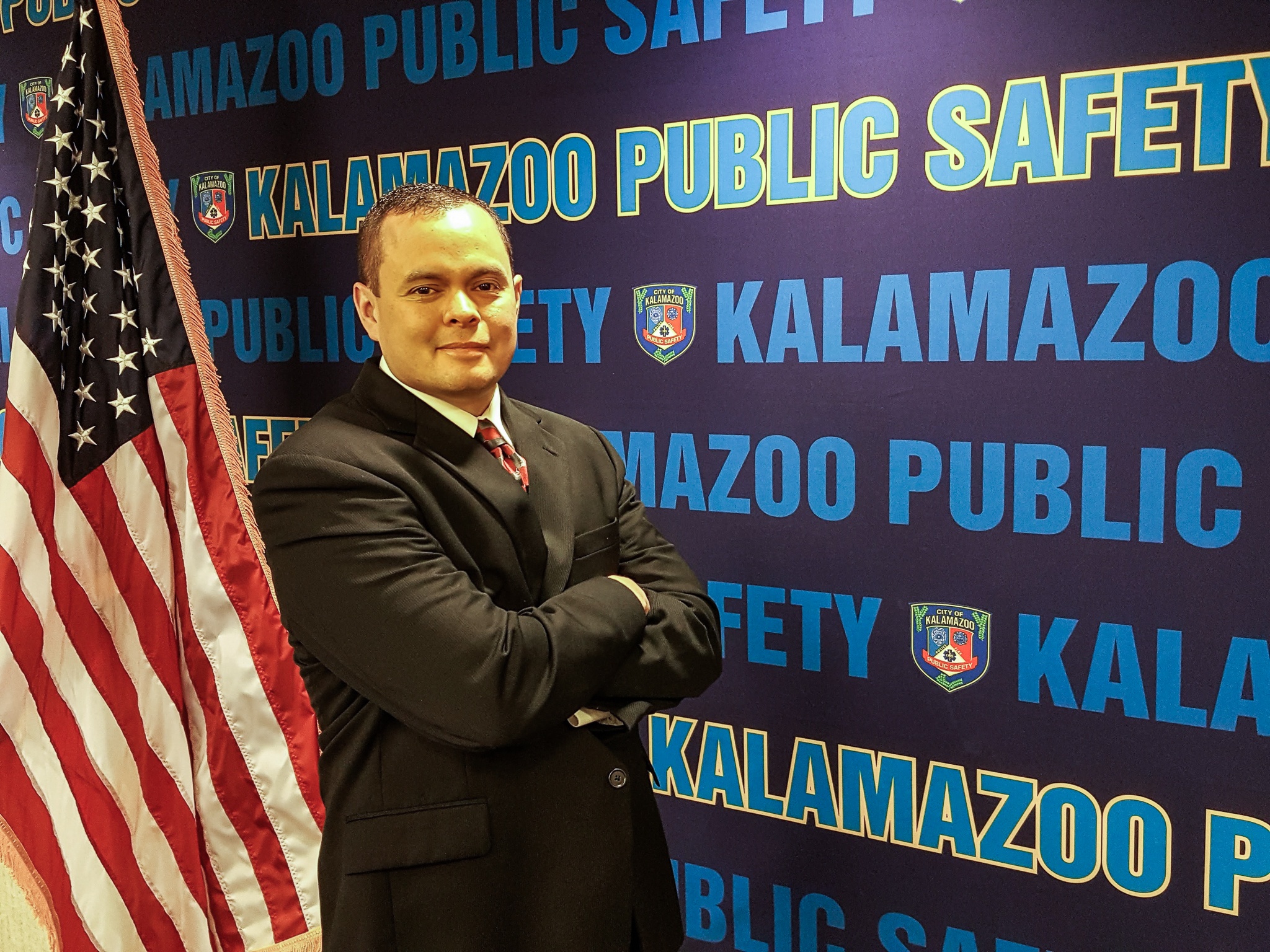
Rafael Diaz (Woodbridge Class, 2010), a lieutenant with the Kalamazoo Department of Public Safety, knew from an early age that he wanted to go to law school. Every decision, from high school through college, was made to position himself for a career in the law.
But, as he was coming to the end of his time in college, he looked at law school again. Married, and with a young daughter, Diaz decided it was not the right time to make a commitment to law school.
“Life kind of creeps up on you,” he remembered. “I had to look at other things. I was volunteering for the Holland Police Department as a reserve police officer and wondered about what to do for work. I reasoned that, since I planned to be a prosecutor in the criminal justice system, what better way to learn about its inner workings than from that vantage point. Well, lo and behold, I really enjoyed it! I loved the police-citizen interactions and I loved the law at that level. So I thought to myself, well, I love law; I love law enforcement; I think I would like to be a police officer. So that’s exactly what I did.”
After five years at the Holland Police Department, Diaz joined Kalamazoo Public Safety in 2005, giving himself more time for family and the opportunity to dream about law school again.
Diaz learned that Cooley’s many scheduling options could make pursuing his dream possible. In 2007, he started law school at Cooley’s Grand Rapids campus taking classes during the day, knowing that if his work schedule changed, he could continue by taking advantage of other scheduling options the law school offered.
“For a person who was on the streets doing night patrol, the fact that Cooley offered classes in the morning, afternoon, evening, and even on weekends, was fantastic,” said Diaz. “So many doors opened for me. I don’t really know of another way I could have really done it, but for Cooley’s scheduling options. As you can imagine, it was hard working nights as a patrol officer and balancing everything else, but the flexibility I was afforded in Public Safety and the opportunity to teach through a joint relationship between Public Safety and a local educational association, gave me the lift I needed to finish law school.”
He continued to work with area high school students, teaching them what it might be like to be a police officer. He enjoyed working with the students, plus he found that his work schedule allowed him to attend evening classes and more time to study.
“The department really stood by me while I was in law school,” said Diaz. “The flexibility I received from work and law school, along with my family’s support and understanding, is how I got to where I am today.”
Law school was tough, but all Diaz’ memories are positive. “My experience at Cooley was one of the best times of my life,” Diaz recalled. “Not only was I busy at work, I was busy in law school. I loved being challenged. I also met a lot of great people. I had a tremendous amount of interaction with people and have stayed in contact with many over the years and built lasting friendships.
“It might not have been the traditional approach,” smiled Diaz, “but it worked for me, and everything seemed to fall into place.”
For Diaz, the professors at Cooley stood out as exceptional teachers. They also made themselves available to help students.
“I have really grown an appreciation for their work and their care of the students,” said Diaz. “Coupled with the friendships and the relationships that I developed, law school was one of the best times ever. Even now I find time to stop by the law school just to say hello. I really loved my time at Cooley.”
HOW HAS A LAW DEGREE HELPED IN A CAREER IN LAW ENFORCEMENT?
Diaz explained that his training and legal education have made him a better person, both personally and professionally.
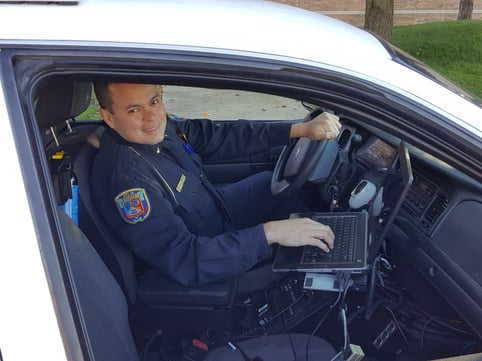
“The law degree is what has broadened my eyes, my perspective, and my approach to so many different issues,” he stated. “I have gone up the ranks, and am now a lieutenant and I got there in a relatively short period of time. I believe it is because the work that I have done and the work that I can do is appreciated. By setting myself apart from other candidates, I have been allowed to progress quickly. It really is a wonderful intersection of my love of law enforcement and my love of law, and the practice of it as an attorney.
“Cooley set me up for success. They taught me how to look at a problem, any problem really, then apply a specific set of skills to analyze the problem and come up with solutions, looking at many sides of an issue. Sometimes in law enforcement we get stuck in only seeing it from one side. That can lead to a lot of frustration when we only want certain outcomes.
“What law school has taught me to do is to examine things from all sides in different ways because people have different points of view. That’s very, very helpful. It gives you a greater understanding and compassion for different views. We may agree to disagree at the end, and that’s OK, but in examining it from all different angles we are able to really see those points and then mesh it in with what the law says about how we have to behave in society. Really, it is an academic exercise in understanding different folks. For me, that has been huge.”
FAMILY MAKES PERFECT
Diaz knows that he owes much to the unconditional support and love of his family.
“I can go back to when I was registering for Cooley Law School,” recalled Diaz. “At the time, I was working as a patrol officer, assigned a night shift. I sat down with my wife and we talked about it. We knew that it was going to be a lifechanging, life-altering event for several years. It basically came down to this, my wife said, ‘If you’re willing to do it and put the work in, I am willing to do everything else, and we will get it done.’ I knew right then that I had the support of my wife.”
But Diaz also had two children to factor into the equation.
“I asked my daughter Alana, who is now 20 and a junior at Western Michigan University, and my son, who is going to be 14, ‘How do you think or feel about me taking this on?’ I said, ‘I am going to need a lot of time to study.’ They both looked at me and said, ‘Dad, if that’s what you want to do, let’s do it!’ “
Even with the full support of his family, Diaz knew there would be times where his family would suffer.
“What I tried to do was balance life as much as I could,” suggested Diaz. “Anything that I had outside of school, work, and family was gone, and I still haven’t picked up the game of golf since, but that’s OK. I want dinner time with my family. I encourage anybody who is looking at law school to carve out time for your family, regardless of how busy you are at work or school. In my mind, if it doesn’t work with family, then it’s all wasted.
“During family time, you put the books to the side, sit down, eat dinner, or watch a show, then when they go to bed, get back at it. I tell you what, I got a lot of strength from my family. Even during those years, I coached my daughter in softball and soccer and my son in baseball and soccer, because I love coaching. You can really tackle anything when you have that family support.
“I was truly blessed because my wife, my daughter, my son have always stood behind me and given me pushes, like, ‘Hey dad shouldn’t you be studying? Why don’t you get after it?’ I am thankful every day for the tremendous support of my family, and at some level I believe it was good for them, modeling good study habits, punctuality, and dedication.
“So, it is a two-way street, and we have all benefited tremendously.”
A DAY IN THE LIFE OF RAFAEL DIAZ
With Public Safety, Diaz believes he has one of the most exciting and rewarding careers in the world.
“In 2008, I had a great opportunity to take a class in crisis intervention and learn how to help mentally ill subjects in crisis,” said Diaz. “The concept was that you can de-escalate a situation and seek positive outcomes by having relationships in the community. We now have a crisis intervention team here in Kalamazoo where we link all the necessary resources. We regularly train large classes, 40 officers at a time, and have built a crisis intervention team trained in mental health issues, coupled with de-escalation training, which reduces the probability for violence.”
The efforts have, over the years, improved the treatment and care of the individuals in crisis. “Those are really the hallmarks of a successful program,” stated Diaz. “We have even been taking our training methods across the state, including a jail diversion program. The overarching principle is, ‘What is the right thing to do?’ We can work on all the other things that go along with that, so long as we have an eye towards getting a good outcome. This model of policing is not only catching fire statewide, but nationally. We are touching lives and that’s really exciting work.”
Diaz may have taken the road less traveled to get to where he is today, but he has succeeded at every turn, proving to one and all that there is more than one pathway to success.
This story was originally published in the June 2017 edition of Benchmark Magazine.


